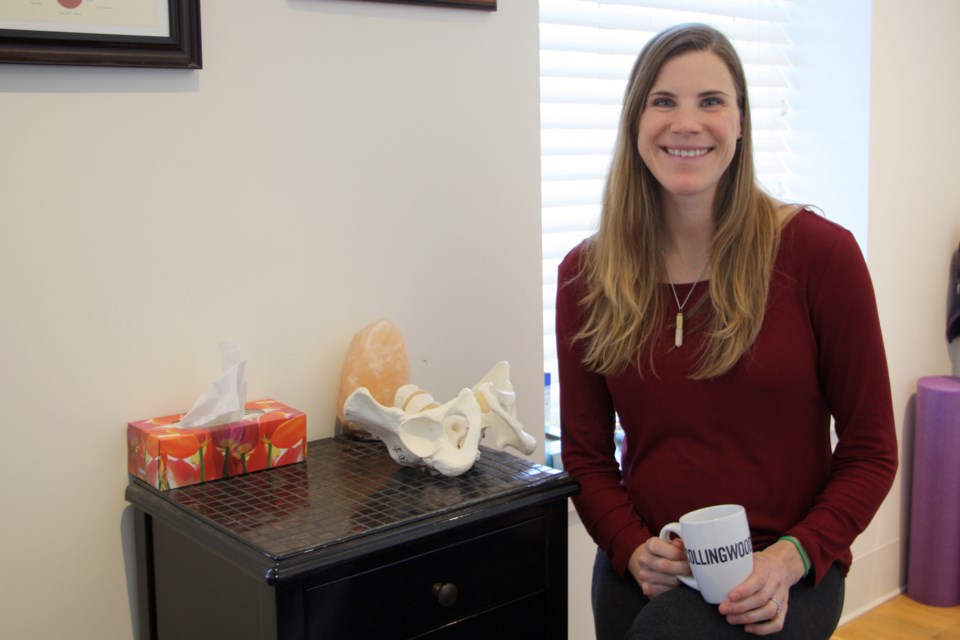One local physiotherapist has discovered a whole new world in her field and it’s a practice entirely devoted to women.
Laura Powers is one of the few pelvic floor physiotherapists in Ontario, and she’s part of a group of health professionals growing the field.
Powers owns Higher Function Women’s Health Centre at the Shipyards health building (28 Huron St.), which she opened a more than a year ago.
“The pelvic floor muscles often get ignored or missed,” said Powers. “But they are still muscles, they suffer from weakness, pain, and tightness.”
The pelvic floor muscles are located at the base of the pelvis and have five main functions including: controlling continence, supporting the organs in the area, stability for the back and hips, contributing to sexual acts, and as a pump in the pelvis to move lymph around.
Powers can use pelvic floor physiotherapy treatments to treat things like incontinence, constipation, prolapse, chronic pain, and pre and post-natal support.
Part of Powers role is educating patients and the general public on the availability of treatment for conditions people believe they have to live with, or are embarrassed to talk about.
“Most of the stuff we treat … there’s a common compliance of ‘I have to live with this,’” said Powers, citing the example of peeing your pants whenever you cough, sneeze, exercise, run, and/or jump.
“It’s more than getting back to a tennis game, this is more day-to-day and self-esteem,” said Powers of her field. “Peeing your pants is socially isolating. [Pelvic Floor Physiotherapists] can make a big difference for it, and most women don’t know about it.”
Powers said she does recommend an internal exam on the first visit in order to better understand what’s going on with the pelvic floor muscles, but it’s not mandatory. Her treatment can be both internal and external, and she works with her patients on lifestyle changes, exercise programs, education, and other strategies they can use at home to help correct the symptoms.
She said the risk factors contributing to pelvic floor muscle issues are pregnancy, delivery, lifestyle, diet, aging, hormones, chronic cough, and some jobs requiring physical lifting.
Unlike typical physiotherapy treatments, Powers said she typically sees her patients once a week for about six to eight weeks.
She said the problems she treats typically stem from weakness or tightness of the pelvic floor muscles, and sometimes it’s a matter of poor coordination.
“People think it’s all about strengthening, but sometimes it’s about relaxing those muscles,” said Powers, adding she works with her patients to make sure they also play a role in their own treatment plan.
Powers grew up in Collingwood, she attended St. Mary’s elementary school and Collingwood Collegiate Institute before attending Boston College and University of Toronto. During her masters degree studies she took a course in gender health and later studied women’s health in Australia.
“I always knew I wanted to be in health care,” said Powers. “One of the reasons I got into this is because I knew people think they have to live with these conditions.”
That’s why she spends a lot of time working to educate more women on the treatments available. She said family doctors and other healthcare workers know about pelvic floor physiotherapy, but if a patient doesn’t bring up concerns or issues they’re experiencing, their family doctors don’t know to refer them to someone like Powers.
Powers’ goal is to add more health care professionals to her team at Higher Function Women’s Health Centre.
“I would love to grow a more expansive women’s health centre,” she said.
She already works with a registered massage therapist, and would like to add an osteopathic doctor and someone who specializes in breast care, particularly for women who have survived breast cancer.
Eventually, Powers hopes to see pelvic floor physiotherapy become part of Ontario’s health care system and covered by the Ontario Health Insurance Plan (OHIP).
In France, said Powers, any woman having a baby is automatically given four to six appointments with a pelvic floor physiotherapist as part of the country’s health care plan.
“We’re being a little more reactive here,” said Powers. “Some issues can be addressed early, and further complications might be potentially delayed or prevented by getting treatment now.”
Currently, pelvic floor physiotherapy is billed the same as other physiotherapy treatments, so can be covered by employee benefits, but not by OHIP.
For more on Laura Powers and Higher Function Women’s Health Centre, click here.



